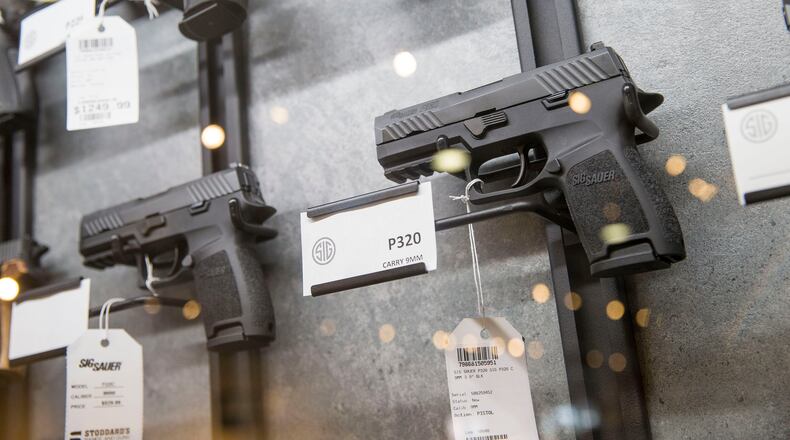There is no greater divide in Georgia politics than the one over guns. And the primary results this week showed that the clash over firearms policies will only intensify on the road to November’s elections.
Democrats rewarded candidates up and down the ballot who broke with party tradition and called for new gun control measures. And they overwhelmingly backed a candidate for governor, Stacey Abrams, who called for a ban on assault rifle sales and a repeal of campus gun laws.
Lucy McBath, who became a nationally known firearms control advocate after her son was gunned down, was the leading vote-getter in the 6th Congressional District primary, while candidates running for suddenly competitive suburban legislative seats made new restrictions on guns central to their pitches.
Republicans, meanwhile, didn’t just hold the line on gun laws. They pushed to dramatically expand them. The two GOP candidates in the July runoff for governor, Lt. Gov. Casey Cagle and Secretary of State Brian Kemp, both back “constitutional carry” rules that allow carrying a gun without a permit.
Other leading GOP candidates took similar stances. The National Rifle Association’s endorsement of Cagle and David Shafer, a candidate for lieutenant governor, helped propel each to runoffs. And Republicans running for posts with little say over gun policy pledged to uphold the Second Amendment.
Interviews with more than a dozen voters across the state highlighted the vast gulf over gun control, which has only deepened after a string of school shootings in Florida and Texas.
“It’s gotten out of control,” said Amy Zeide, a nonprofit executive in Dunwoody who voted Democratic. “It’s not about thoughts and prayers anymore. It’s got to be more about policy and mental health — and taking it out of hopes and feelings and putting it into policy and practice.”
Pro-gun advocates are stiffening their support. Sammy Howard was drawn to Cagle in part because of his NRA endorsement, which he earned after successfully killing a jet fuel tax break for Delta Air Lines after it ended discounted flights for members of the gun lobby.
“We need to protect our families at all costs,” said Howard, who lives in Suwanee. “You take the general public’s guns away and the bad guys are still going to have them.”
‘Epidemic’
For Georgia Democrats, the stance is a stark shift from decades of policy. Top Democrats once curried the NRA’s favor and fought restrictions; now most wear poor grades from the pro-gun group as a badge of honor. Those that still support expanding gun rights are largely silent on the issue.
U.S. Rep. John Barrow once brandished guns owned by his forefathers in campaign ads, ending one with a postscript: “I approved this message because these are my guns now, and ain’t nobody gon’ take ‘em away.”
Now he largely steers clear of the firearms debate, though when pressed he talks about the need for supporters on both sides of the issue to conduct "conscientious" debate. Instead, he sticks primarily to voting issues and redistricting proposals in his bid for secretary of state, which oversees state election policy.
The divide may be most pronounced at the top of the ticket.
Former state Sen. Hunter Hill, who finished in third place in Tuesday’s GOP primary for governor, was pummeled in the closing weeks of the race for remarks he made suggesting he would raise the age limit to buy certain weapons after 17 people were killed in a shooting at a Parkland, Fla., high school.
And Kemp’s rise to second place was in part thanks to an ad that featured him cleaning a shotgun next to his daughter’s young male suitor. He also begged the NRA to stay out of the contest — he warned the gun group it had been bamboozled by Cagle — while touting support from GeorgiaCarry.org, a state offshoot.
The Democrats, meanwhile, scrapped over which candidate would more vigorously fight for gun control. Abrams touted her “F” rating from the NRA and, in her victory speech, spoke of undoing a 2017 law that lets some carry guns on public campuses in the same breath as an expansion of the HOPE scholarship.
A growing number of Democrats insist on that position. Matt Shores, a Buckhead voter who works in insurance, said he was driven to the polls in part to vote for Abrams’ “vision for gun restrictions” after the latest school shooting.
“It’s become such an epidemic in this country,” Shores said, “and nothing is being done about it.”
And there are early signs the GOP embrace of gun rights is firing up voters across the ticket. Tony Martin, a retiree who voted Democratic, said he often doesn’t vote in primaries but cast a ballot Tuesday.
“I know you listen to the news — there’s too much violence caused by guns,” he said as he left an Atlanta voting precinct. “Some guy had an ad with a shotgun. He was blowing up stuff. It’s shocking.”
Republicans are banking on the gun debate to trigger their voters, too.
A recent Atlanta Journal-Constitution poll showed a broad majority of primary voters want stricter gun control measures, including a growing number of Republicans. But GOP voters also gave the NRA a glowing approval rating. And John Padgett, a former Georgia GOP chairman, said conservatives are eager to defend gun rights in November.
“The Second Amendment is just crucial to this country and the opportunity for this country to progress,” he said, “and to stay a viable country.”
2018 campaign
The Atlanta Journal-Constitution is covering the issues and candidates in a busy election year. In the run-up to the Georgia primary, the AJC explored how immigration, tax policy and the growing number of female candidates were shaping Georgia’s political scene. Look for more at PoliticallyGeorgia.com as the state approaches the next political milepost, the July 24 runoff.
About the Author
Keep Reading
The Latest
Featured




